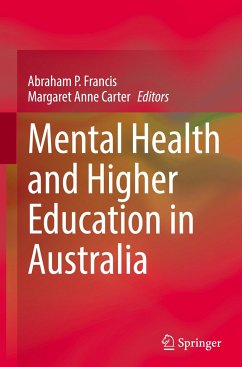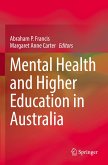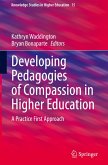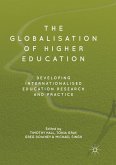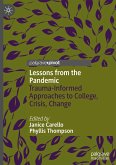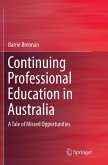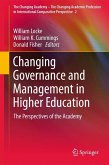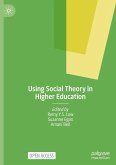Mental Health and Higher Education in Australia
Herausgegeben:Francis, Abraham P.; Carter, Margaret Anne
Mental Health and Higher Education in Australia
Herausgegeben:Francis, Abraham P.; Carter, Margaret Anne
- Gebundenes Buch
- Merkliste
- Auf die Merkliste
- Bewerten Bewerten
- Teilen
- Produkt teilen
- Produkterinnerung
- Produkterinnerung
This book addresses a broad range of issues related to mental health in higher education in Australia, with specific reference to student and staff well-being. It examines the challenges of creating and sustaining more resilient cultures within higher education and the community. Showcasing some of Australia's unique experiences, the authors present a multidisciplinary perspective of mental health supports and services relevant to the higher education landscape. This book examines the different ways Australian higher education institutions responded/are responding to the COVID-19 pandemic,…mehr
Andere Kunden interessierten sich auch für
![Mental Health and Higher Education in Australia Mental Health and Higher Education in Australia]() Mental Health and Higher Education in Australia121,99 €
Mental Health and Higher Education in Australia121,99 €![Developing Pedagogies of Compassion in Higher Education Developing Pedagogies of Compassion in Higher Education]() Developing Pedagogies of Compassion in Higher Education121,99 €
Developing Pedagogies of Compassion in Higher Education121,99 €![The Globalisation of Higher Education The Globalisation of Higher Education]() The Globalisation of Higher Education89,99 €
The Globalisation of Higher Education89,99 €![Lessons from the Pandemic Lessons from the Pandemic]() Lessons from the Pandemic53,99 €
Lessons from the Pandemic53,99 €![Continuing Professional Education in Australia Continuing Professional Education in Australia]() Barrie BrennanContinuing Professional Education in Australia81,99 €
Barrie BrennanContinuing Professional Education in Australia81,99 €![Changing Governance and Management in Higher Education Changing Governance and Management in Higher Education]() Changing Governance and Management in Higher Education121,99 €
Changing Governance and Management in Higher Education121,99 €![Using Social Theory in Higher Education Using Social Theory in Higher Education]() Using Social Theory in Higher Education41,99 €
Using Social Theory in Higher Education41,99 €-
-
-
This book addresses a broad range of issues related to mental health in higher education in Australia, with specific reference to student and staff well-being. It examines the challenges of creating and sustaining more resilient cultures within higher education and the community. Showcasing some of Australia's unique experiences, the authors present a multidisciplinary perspective of mental health supports and services relevant to the higher education landscape. This book examines the different ways Australian higher education institutions responded/are responding to the COVID-19 pandemic, with reference to domestic and international students. Through the exploration of practice and research, the authors add to the rich discourses on well-being in the higher education.
Produktdetails
- Produktdetails
- Verlag: Springer / Springer Nature Singapore / Springer, Berlin
- Artikelnr. des Verlages: 978-981-16-8039-7
- 1st edition 2022
- Seitenzahl: 380
- Erscheinungstermin: 13. März 2022
- Englisch
- Abmessung: 241mm x 160mm x 26mm
- Gewicht: 735g
- ISBN-13: 9789811680397
- ISBN-10: 9811680396
- Artikelnr.: 62752081
- Herstellerkennzeichnung Die Herstellerinformationen sind derzeit nicht verfügbar.
- Verlag: Springer / Springer Nature Singapore / Springer, Berlin
- Artikelnr. des Verlages: 978-981-16-8039-7
- 1st edition 2022
- Seitenzahl: 380
- Erscheinungstermin: 13. März 2022
- Englisch
- Abmessung: 241mm x 160mm x 26mm
- Gewicht: 735g
- ISBN-13: 9789811680397
- ISBN-10: 9811680396
- Artikelnr.: 62752081
- Herstellerkennzeichnung Die Herstellerinformationen sind derzeit nicht verfügbar.
Dr Abraham P. Francis is an Associate Professor, Head of Social Work and Human Services academic group at James Cook University, Australia, Adjunct Faculty for MSW Programs, Prasanna School of Public Health (PSPH) (Manipal), and a research fellow at the Department of Social Work, Stellenbosch University, South Africa. He has worked with Government, Non-government, and corporate sectors, and has developed many international partnerships. He has extensively contributed to the literature on Social Work and social work practice in mental health through his publications, convening conferences, establishing research collaborations and developing consortiums. His other research interests are in the field of communities, criminal justice, international social work, and gerontological social work. His excellence in teaching has been recognised on several occasions. In 2010, Dr Francis was a recipient of James Cook University's Inclusive Practice Award for his"exceptional support for students with a disability". In 2016, he received the University's 'Citation for Outstanding Contributions to Student Learning' for his "leadership and expertise in social work education in mental health that inspires and nurtures students to be competent, confident and compassionate practitioners". In 2018, Dr Francis received the NAPASWI (National Association of Professional Association Social Workers in India) lifetime achievement for his outstanding contribution to Social Work Education. Professor Margaret Anne Carter commenced at Australian College of Applied Psychology (ACAP) in 2019 as Chair of the Discipline of Counselling for Australia. Before coming to ACAP, Margaret Anne was employed at James Cook University as a lecturer since 2010, first in Singapore as a Senior Lecturer in Education (2010-2013) and then in Australia as a Senior Lecturer in Education, and then Associate Professor (2017-2018). Prior to joining JamesCook University in 2010, Margaret Anne worked as a School Guidance Counsellor at Brisbane Catholic Education, the CEO of M.A. Carter Consultancy, District Guidance Counsellor and Special Education Consultant Brisbane Catholic Education, and Pre-school Teacher. Margaret Anne completed her Diploma of Teaching Primary and Preschool at Brisbane College of Advanced Education, a Bachelor of Educational Studies and Master of Educational Studies at University of Queensland, and Doctor of Education at Queensland University of Technology. Margaret Anne is currently an adjunct professor with James Cook University and is a member of several doctoral supervisory teams. Margaret Anne's scholarly work with higher degree research candidates, both locally and globally, focuses on leading socially sustainable change. Her scholarship and research in cyber safety and mental health is grounded in understanding that mental health is everyone's business.
Part 1: An evolving higher education landscape in Australia including institutional and curriculum responses.-Chapter 1. Introduction ( Abraham Francis).-Chapter 2. 2. Developing a University Mental Health Framework for Australia (Vivienne Browne and Penny Carlson).-Chapter 3. COVID-19 and the Changing Higher Education Landscape (Margaret Anne Carter, Vicki Hutton, Hyacinth Udah and Abraham P. Francis).- Cultural Partnership Practice and Mental Health in Higher Education (Narayan Gopalkrishnan and Hurriyet Babacan).-Chapter 5. Investigating whether law schools in the UK and Australia are workplaces that support the Wellbeing of law teachers. (Rachael Field, Caroline Strevens and Colin James).-Chapter 6. Creating Humanistic teaching approaches and developing pedagogical partnerships in promoting wellbeing in Higher Education (Mark David Chong, Abraham P Francis, , Margaret Anne Carter, and Frank Baffour).-Chapter 7. Student support in rural medical education: What does evidence-based practice look like? (Anna Kokavec, Jane Harte and Simone Ross).- Part 2: Interdisciplinary Research Initiatives.-Chapter 8. Exploring Visual Art Students' Wellbeing: A Multi-level Research Approach (Eileen Siddins). -Chapter 9. Reimagining higher education curricula for creative and performing artists: creating more resilient and industry-ready graduates (Ryan Daniel).-Chapter 10. Embedding an Aboriginal wellbeing intervention in Australian social work curriculum (Fiona Gardner, Mary Whiteside, Rachael Sanders).-Chapter 11. Promoting the mental wellbeing of law students through the curriculum and communities of practice (Dr. Ozlem Susler and Alperhan Babacan).- Chapter 12. How Perfectionism, Procrastination and Parenting Styles Impact Students Mental Health And How Mindfulness And Self-Compassion May Be The Antidote (Kaz Mitchell).- Chapter 13. Impact of COVID-19 pandemic on the higher education arrangements and mental well-being of students: A review (Saradamoyee Chatterjee).- Part 3: Community Initiatives, Responses and Ways Forward .-Chapter 14. The Impact of Relationship Issues on the Mental Health of Students in Higher Education (Raquel Peel & Natalie Ward).-Chapter 15. Detoxing University Through Creative Engagement: (Ross W. Prior).-Chapter 16. Art, truth and beauty in the classroom: Individual creativity, knowledge, and the natural emergent properties of a self-organising system (Richard Hill).- Chapter 17. International students in Australia During Covid-19 (Venkat Pulla, Elizabeth Carter, Abraham P Francis).- Chapter 18. COVID-19 and mental health and wellbeing of higher education international students (Hyacinth Udah & Abraham P Francis) .- Chapter 19. Mental health in higher education and the community - building capability, sharing experience (Jeremy Audas).- Chapter 20. Interprofessional collaboration in promoting wellbeing in the Higher Education Sector: The AMHHEC Experience (Beryl Buckby).- Chapter 21. Mentally Healthy City Townsville: Promoting Well-being in Communities (Sue McGinty, Catherine Day, Kathryn Montafia, Anneliese Young, Zoltan Sarnyai).
Part 1: An evolving higher education landscape in Australia including institutional and curriculum responses.-Chapter 1. Introduction ( Abraham Francis).-Chapter 2. 2. Developing a University Mental Health Framework for Australia (Vivienne Browne and Penny Carlson).-Chapter 3. COVID-19 and the Changing Higher Education Landscape (Margaret Anne Carter, Vicki Hutton, Hyacinth Udah and Abraham P. Francis).- Cultural Partnership Practice and Mental Health in Higher Education (Narayan Gopalkrishnan and Hurriyet Babacan).-Chapter 5. Investigating whether law schools in the UK and Australia are workplaces that support the Wellbeing of law teachers. (Rachael Field, Caroline Strevens and Colin James).-Chapter 6. Creating Humanistic teaching approaches and developing pedagogical partnerships in promoting wellbeing in Higher Education (Mark David Chong, Abraham P Francis, , Margaret Anne Carter, and Frank Baffour).-Chapter 7. Student support in rural medical education: What does evidence-based practice look like? (Anna Kokavec, Jane Harte and Simone Ross).- Part 2: Interdisciplinary Research Initiatives.-Chapter 8. Exploring Visual Art Students' Wellbeing: A Multi-level Research Approach (Eileen Siddins). -Chapter 9. Reimagining higher education curricula for creative and performing artists: creating more resilient and industry-ready graduates (Ryan Daniel).-Chapter 10. Embedding an Aboriginal wellbeing intervention in Australian social work curriculum (Fiona Gardner, Mary Whiteside, Rachael Sanders).-Chapter 11. Promoting the mental wellbeing of law students through the curriculum and communities of practice (Dr. Ozlem Susler and Alperhan Babacan).- Chapter 12. How Perfectionism, Procrastination and Parenting Styles Impact Students Mental Health And How Mindfulness And Self-Compassion May Be The Antidote (Kaz Mitchell).- Chapter 13. Impact of COVID-19 pandemic on the higher education arrangements and mental well-being of students: A review (Saradamoyee Chatterjee).- Part 3: Community Initiatives, Responses and Ways Forward .-Chapter 14. The Impact of Relationship Issues on the Mental Health of Students in Higher Education (Raquel Peel & Natalie Ward).-Chapter 15. Detoxing University Through Creative Engagement: (Ross W. Prior).-Chapter 16. Art, truth and beauty in the classroom: Individual creativity, knowledge, and the natural emergent properties of a self-organising system (Richard Hill).- Chapter 17. International students in Australia During Covid-19 (Venkat Pulla, Elizabeth Carter, Abraham P Francis).- Chapter 18. COVID-19 and mental health and wellbeing of higher education international students (Hyacinth Udah & Abraham P Francis) .- Chapter 19. Mental health in higher education and the community - building capability, sharing experience (Jeremy Audas).- Chapter 20. Interprofessional collaboration in promoting wellbeing in the Higher Education Sector: The AMHHEC Experience (Beryl Buckby).- Chapter 21. Mentally Healthy City Townsville: Promoting Well-being in Communities (Sue McGinty, Catherine Day, Kathryn Montafia, Anneliese Young, Zoltan Sarnyai).

